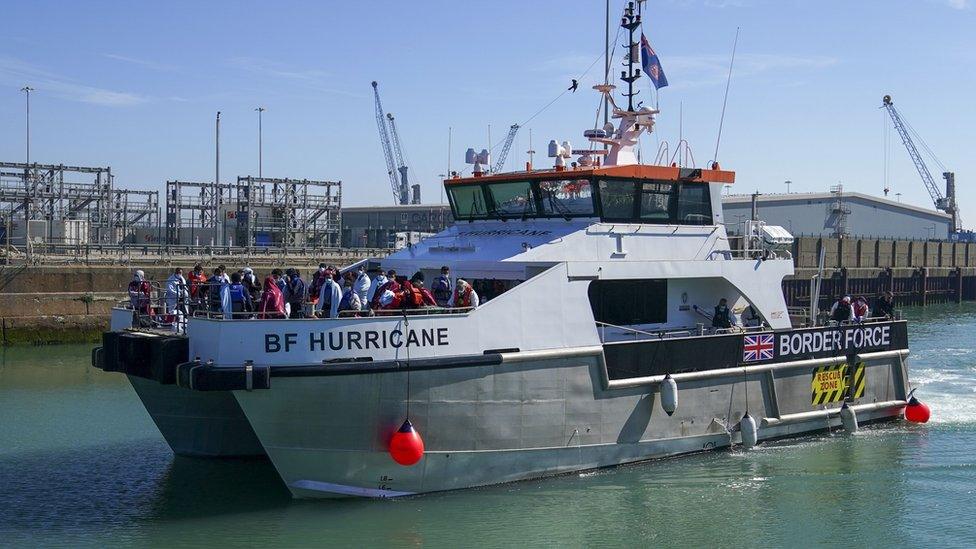Migrant crossings: Number reaching UK this year three times 2020's total
- Published
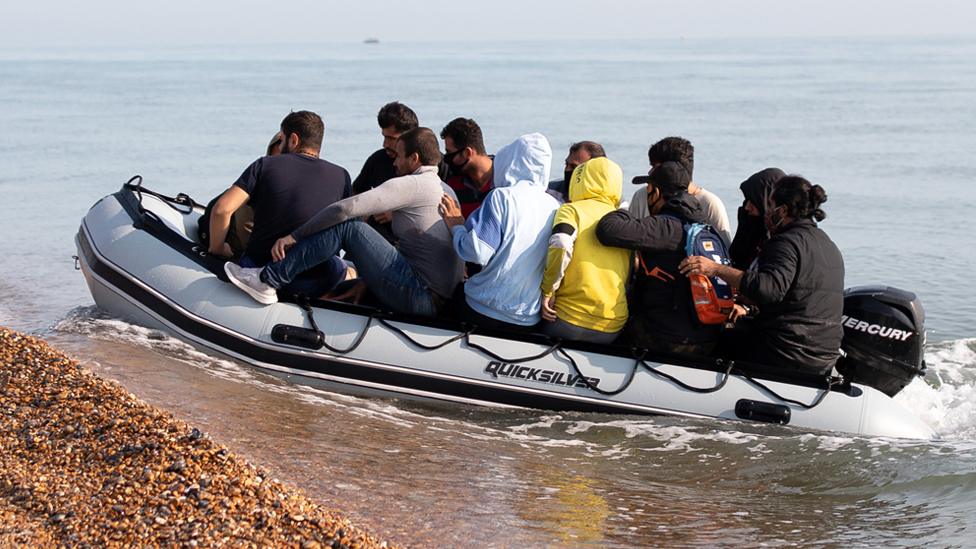
The number of migrants to have reached the UK by boat this year is now more than three times the 2020 total.
The Home Office said 886 people arrived on Saturday, bringing the 2021 total to more than 25,700. The figure for last year was 8,469.
More than 1,000 migrants arrived in one day earlier this month, a new record.
Home Secretary Priti Patel told MPs there was a "global migration crisis" and the number of illegal migrants departing France was "unacceptable".
In answer to an urgent Commons question on the crossings from shadow home secretary Nick Thomas-Symonds, she said the government's Nationality and Borders Bill, external was the "long-term solution" to tackling the issue "on top of a raft of operational and diplomatic work".
A Home Office spokesperson added: "The British public have had enough of seeing people die in the Channel while ruthless criminal gangs profit from their misery and our new plan for immigration will fix the broken system which encourages migrants to make this lethal journey."
While the number coming across the Channel by boat has soared, that is only part of the picture regarding migrants - as this year has seen far fewer using other strategies to enter the country undetected.
It means that, overall, the number of people to have claimed asylum in the UK in the year ending June 2021 was 31,115, a 4% fall on the previous 12 months.
The government's plan would change the law so that people facilitating Channel crossings would face a maximum sentence of life in prison.
The proposed changes to immigration, being considered by MPs, would see people seeking protection as refugees having their asylum claim partly assessed on how they arrived in the UK. People arriving by what the government calls illegal means would no longer have the same entitlement to claim asylum.
On Saturday, there were 28 separate events, leading to the 886 people either being rescued or intercepted. That same day, French authorities intervened 14 times, preventing 466 people reaching the UK.
It is thought at least 10 people have died in the past few weeks while attempting to make the crossing.

A switch of strategy

What we are counting here are the numbers of people who have crossed the Channel in small boats this year and arrived in the UK - the vast majority going on to claim asylum in Britain.
However, Home Office figures on overall asylum claims show a 4% fall year-on-year, with fewer people requesting sanctuary in the year to June 2021 than a year earlier.
What appears to have happened is that those looking to claim asylum in the UK have switched their strategy.
In the past, migrants might have come by aircraft or tried to enter on lorries - but a combination of factors including increased security and Covid have made those traditional routes less viable. So now the people smugglers and the desperate migrants are using small boats.
The Home Office believes its best strategy is to reform the asylum system so that those who come by unauthorised routes are much more likely to be sent back.
However, since Brexit, the UK has no return arrangements with any EU country. In the whole of this year, of the 25,000 migrants arriving in small boats, the UK has managed to return just five.

A review into how to prevent migrants crossing the English Channel to reach the UK is going to be led by Cabinet Office minister Stephen Barclay, after the home secretary promised tougher action.
Mr Barclay will explore what ministerial departments can do to make the issue more of a priority in government.
The prime minister's spokesman said "there is more that can be done to step up this enforcement" from both France and the UK.
"We continue to believe that there is more that can be done on both sides," he said. "We are introducing these new powers [in the Nationality and Borders Bill], we will continue to work closely with our French counterparts.
He said that joint efforts had stopped more than 20,000 attempts at crossings so far this year.
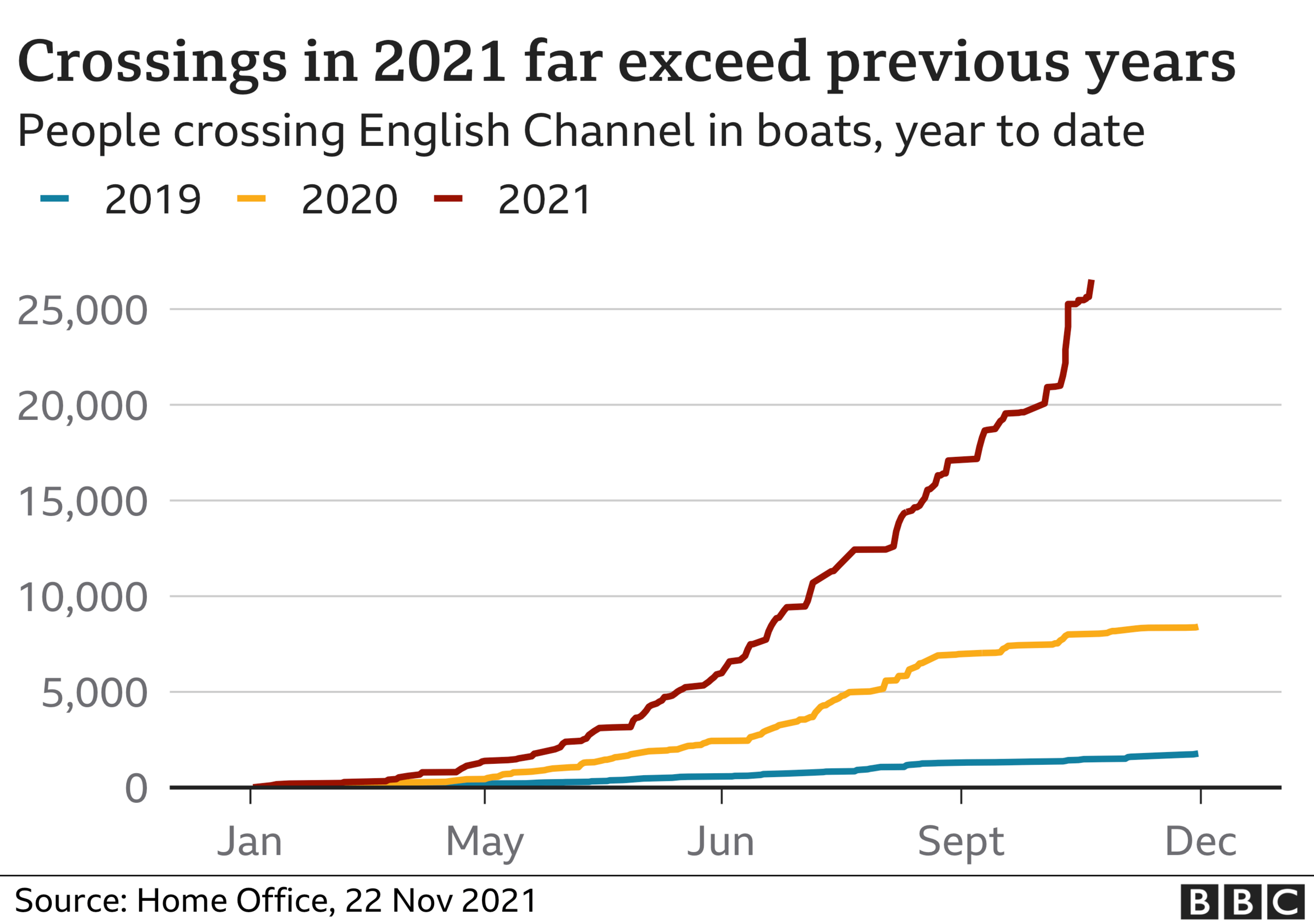
In an agreement signed in July, the UK pledged to give France €62.7m (£54m) during 2021-22 to help tackle the issue.
The deal said the UK would help France increase police patrols along its coastline, boost aerial surveillance and increase security infrastructure at ports.
Speaking in the House of Commons on Monday, Labour MP Yvette Cooper highlighted evidence to the Home Affairs committee that UK-funded drones were not being used by the French authorities to help prevent the crossings.
The home secretary said France had in the past week accepted a number of UK proposals around the use of "surveillance" as well as other technology including sensors on beaches and automatic number plate recognition.
The people who cross the Channel come to the UK from the poorest and most vulnerable parts of the world - including Yemen, Eritrea, Chad, Egypt, Sudan and Iraq.
Under international law, people have the right to seek asylum in whichever country they arrive, and there is nothing to say you must seek asylum in the first safe country. It is very hard to apply to the UK for asylum unless you are already in the country.

What happens to migrants in the English Channel?

If migrants are found in UK national waters, it is likely they will be brought to a British port
If they are in international waters, the UK will work with French authorities to decide where to take them
Each country has search-and-rescue zones
An EU law called Dublin III allows asylum seekers to be transferred back to the first member state they were proven to have entered but the UK is no longer part of this arrangement and has not agreed a new scheme to replace it


THE NEW LABOUR REVOLUTION: Two powerful personalities at the heart of a political phenomenon
FROM TOM HANKS TO EMMA THOMPSON: Check out the great films on BBC iPlayer

- Published21 November 2021
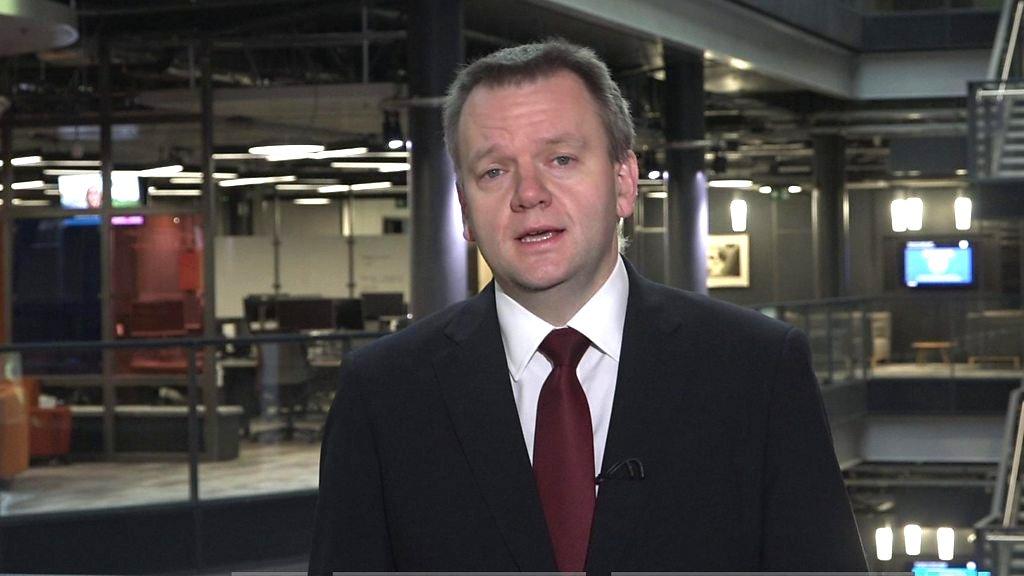
- Published13 December 2023
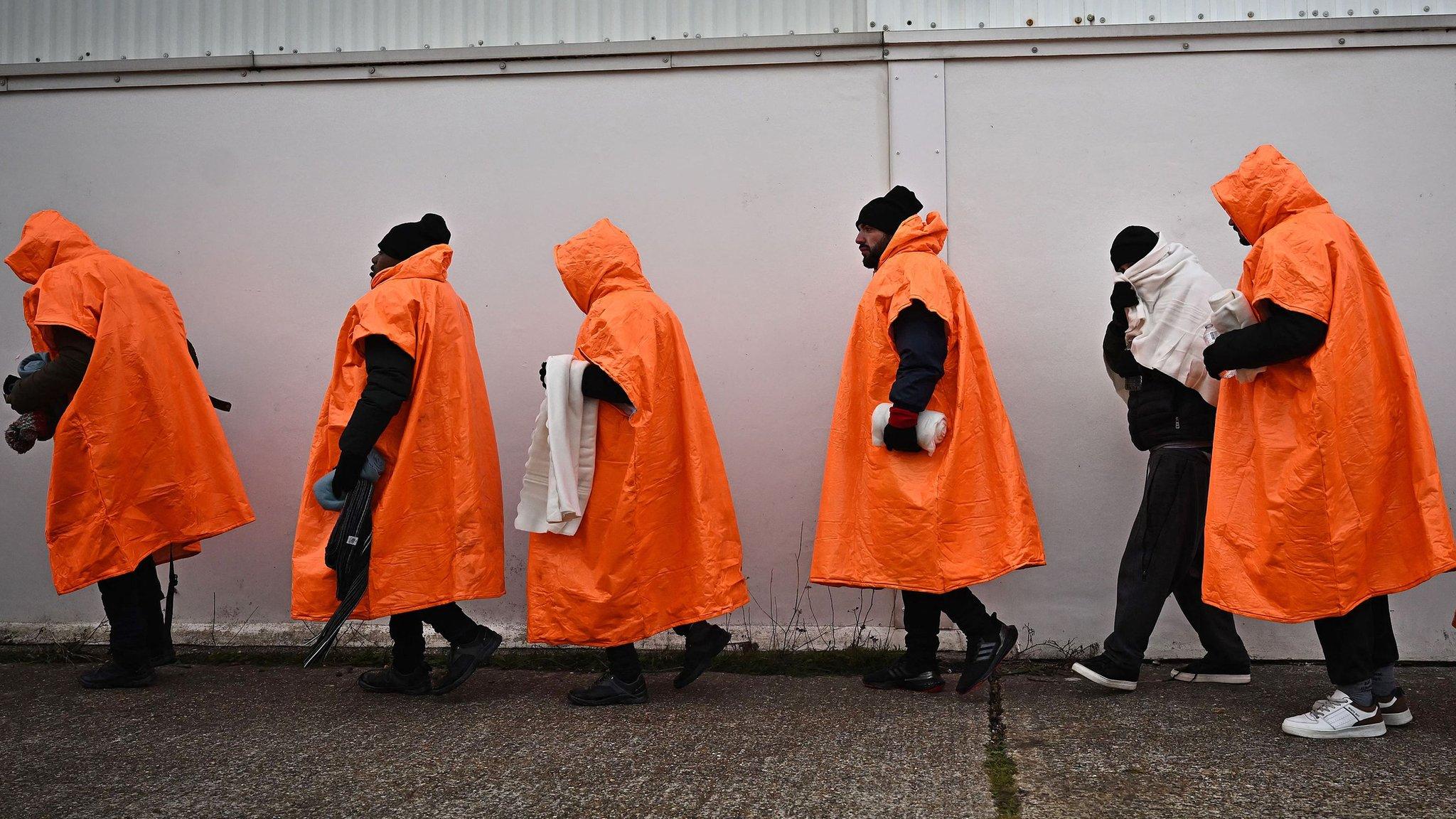
- Published20 November 2021
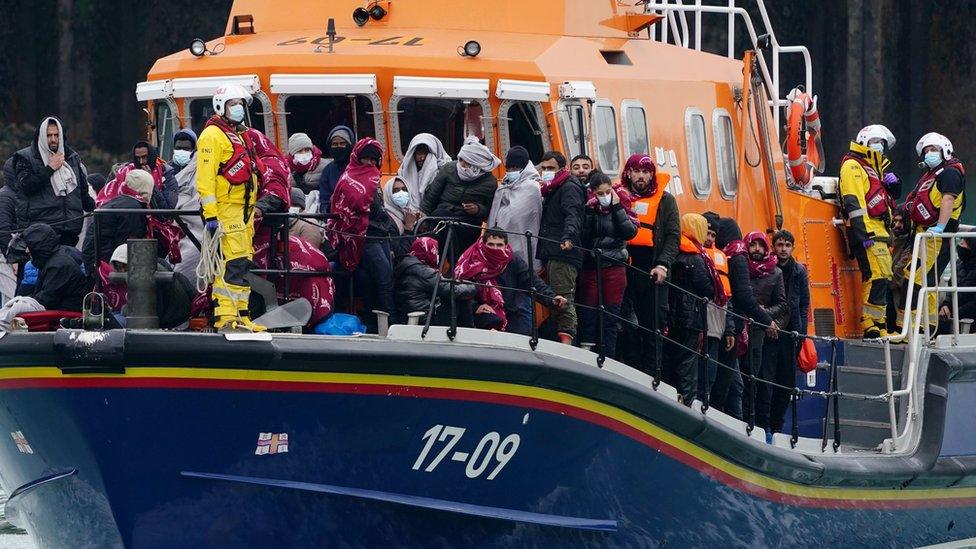
- Published17 November 2021
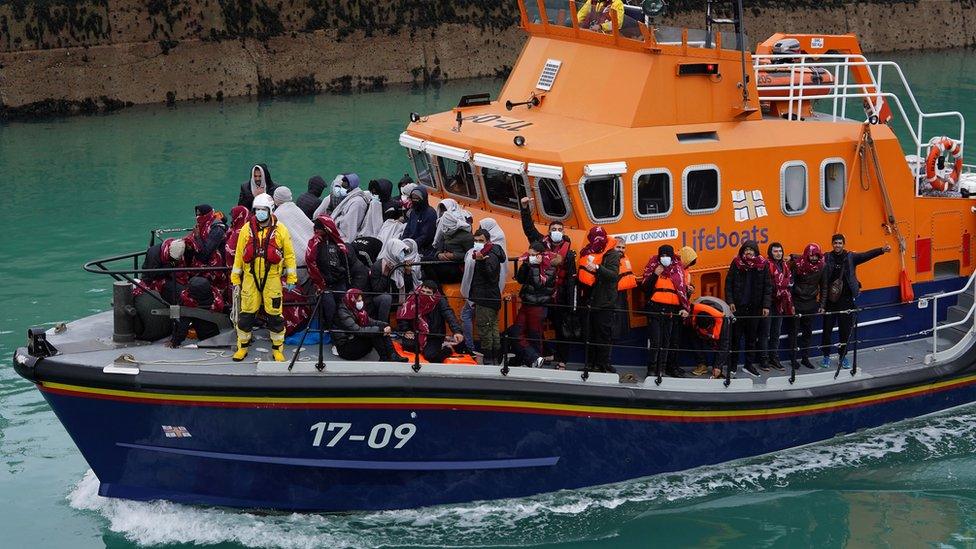
- Published9 September 2021
